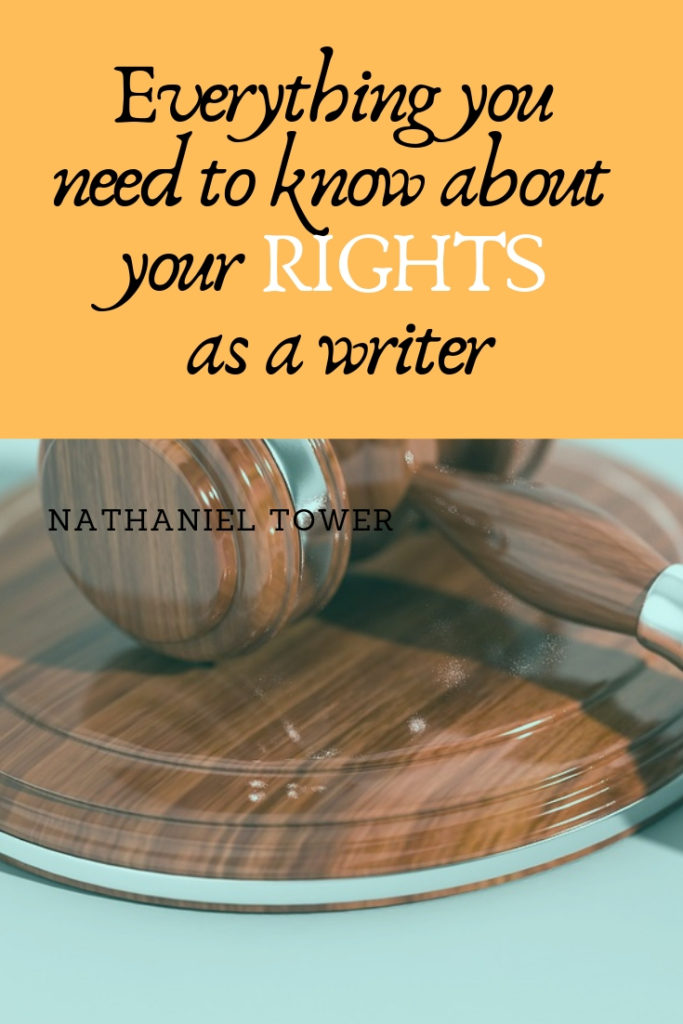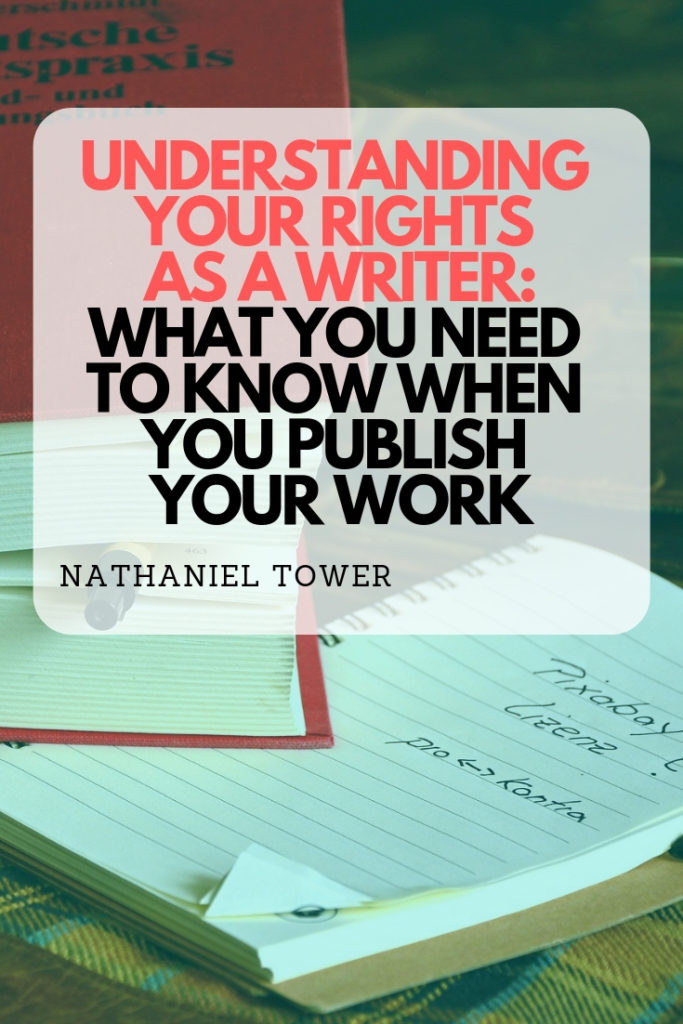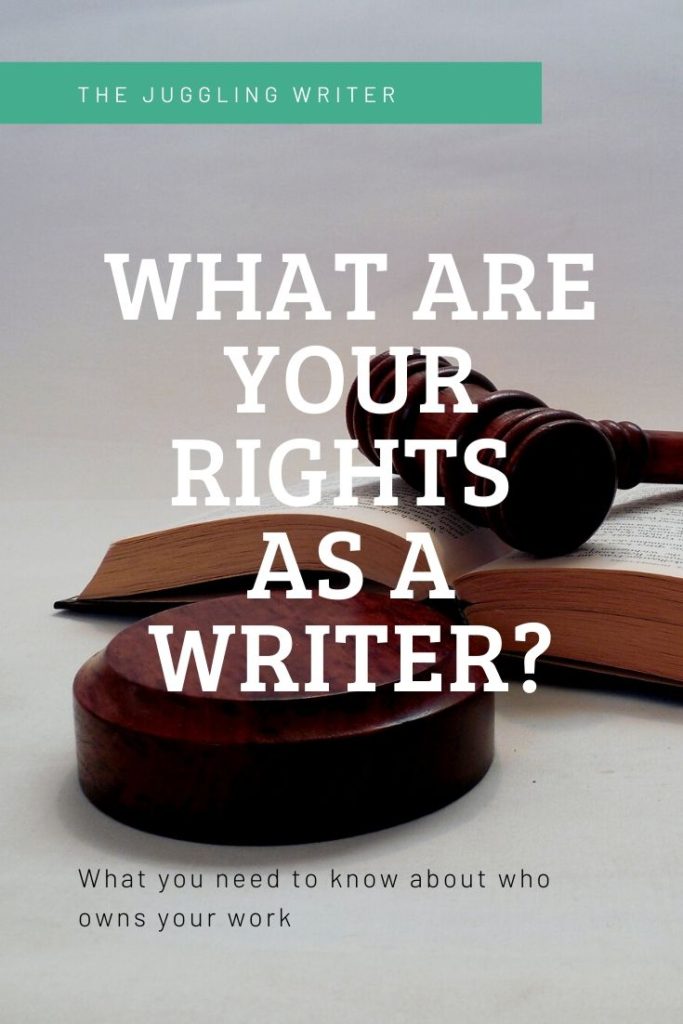Last Updated on June 20, 2020 by Nathaniel Tower
As writers, we tend to get pretty excited at the prospect of publication. Oftentimes, an acceptance is such a relief that we’ll take it no matter what. However, sometimes an acceptance isn’t in our best interest. We have to step back from the excitement and look at the fine print to make sure we aren’t giving away something we don’t want to lose.
Another writer recently told me his story had been accepted for publication, but he wasn’t sure about the terms. The publisher was offering him $25 to publish the story. In exchange, they would have all rights to the work. The writer was justifiably concerned. Did all rights mean the publisher could sell this story for a hundred-thousand-dollar movie deal without giving the writer a dime? Would the writer be able to use this piece in a short story collection in the future?
Not wanting to sell his soul for $25, the author asked the publisher for clarification. They never responded, so he took his piece elsewhere. The publisher in question was a pretty big name, and the story would undoubtedly get a lot of attention. However, this wasn’t enough to justify that dubious “all rights” phrase.
I commend this writer. It’s too easy to be blinded by acceptance. It’s even easier to be swayed by money. As writers, we have to be aware of what we are giving away.
Surprisingly, many publications don’t send out any type of contract or agreement to their writers when they accept a piece. This is especially true of so-called “exposure” markets (the kind that don’t pay but promise to promote your work). Some of these publications state in their submission guidelines what type of rights they are seeking. Many of the publications don’t say a word about it.

This can be a dangerous exchange, both for the writer and the publication.
Types of rights a publisher might request
As a writer, it’s important to be familiar with the different types of rights. Here’s a brief rundown of what publishers typically ask for:
- First rights
- One-time electronic rights
- Print rights
- Worldwide rights
- 6 months exclusivity, all rights reverting back to the author
- Forever rights
- Sell your soul for this publication, motherfucker
First rights mean “first”
If a publisher is asking for first rights, then your story must never have been published before. Technically, that means it must never have appeared in a public venue (yes, your blog is included as public, but that secret online writing forum probably wouldn’t count).
One of the most confusing terms is the common “all rights revert back to the author.” While this sounds like a great deal, it isn’t completely true. Once you give away first rights, you can never have those back. To say you are getting “all rights” back is misleading. A more accurate description would be, “We ask for first publication rights; after publication, all other rights will revert back to the author.”
Ask if you don’t understand
If you don’t understand the rights a publication is requesting, then you need to ask. You don’t want to assume the publisher just wants this or that. Hell, a publisher could have a disclaimer in their submissions policy that states:
By submitting, you agree to all of our policies. If we accept your work, we will make millions while you struggle to feed your family of rats in your tiny studio apartment. In many cases, we actually will also gain rights to your rats and your tiny studio apartment.
If a venue won’t tell you what rights they want—or if they don’t know—then you need to walk away. No publication credit or token payment is worth having your rights as an author violated.
Know your rights
It’s very important to understand the rights a publisher is requesting. Imagine if you couldn’t include your favorite short story in your forthcoming collection. Or if you couldn’t release your novel because an excerpt had been published elsewhere. Before accepting an acceptance, understand what it means for the future of your work.
What rights are you typically willing to give up, and for what price? Share your thoughts in the comments, and don’t forget to share this post with other writers.



Thank you for this post, it was helpful.
As to what I’m typically willing to give up when it comes to artistic/creator rights, it really depends on the project and the direction I want it to go in. Giving away full rights seems unnecessary though, unless it was a piece to throw into the wind and never touch again…
Dealing with negotiations and contracts makes me lean towards self-publishing because that seems like it would be the most empowering role to have in the direction of a novel/story. But don’t self-pub platforms (like Amazon) have similar Right distinctions too, do you know anything about that? I suppose I could go look it up on my own, but thought I’d ask. 🙂
Dominika, thank you for reading and commenting. I definitely agree that it rarely makes sense to give away full rights. Even if you have a throwaway piece, I wouldn’t recommend it. Rather, I’d recommend you throw that piece away (or try to make it better).
As far as self-publishing, I know that Amazon requires you to have the rights to publish it. In the publishing platform itself, this is basically a yes/no question, but they also have a long-winded legal explanation that most writers probably won’t understand. When you self-publish, you are granting certain rights to that self-publishing platform. For example, if you enroll in Amazon’s KDP Select and Kindle Unlimited options, you are basically giving Amazon all of the rights to publish your book in the electronic format. I know of a publisher who recently almost had their account suspended because they started selling their KDP Select books through their website in various electronic formats.
The issue of rights is very complicated. Certainly much more complex than this discussion. If you ever land a big deal–or if you have a work you really are passionate about–then the best bet is to consult with a contract lawyer. Otherwise, you may not know what you are giving away.
You’re welcome and thank you for the insight and advice. One can never be too careful, that’s for sure, thanks again!
Putting a lot of effort into your writing and getting nothing back is often a hard reality!